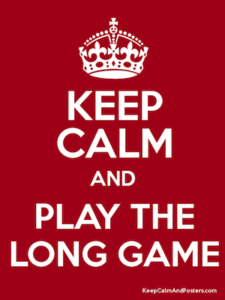 The short game of parenting is providing necessities such as food, clothing and shelter; and keeping your child physically, mentally and emotionally safe.
The short game of parenting is providing necessities such as food, clothing and shelter; and keeping your child physically, mentally and emotionally safe.
The Parenting Long Game unfolds over time. It involves passing on values and heritage; and teaching life and relationship skills, good habits, and the rules of the road. It is not based on a specific moment or event but rather an accumulation of many, many moments. This is good news because it means that having a bad interaction, day or even area that you never get right doesn't mean that overall, you (and your child) don't win.
The key to winning the Parenting Long Game is embedding as many of your longer-term parenting goals into the minutes and moments of the day. The challenge is that there are SO many moments to get through. So much to keep track of. And sometimes all you want is for them be in bed!
So how to get there? First, know what your Parenting Long Game goals are by reflecting on this question: When my child is all grown up and living their own life, what traits, values, skills and habits do I want him or her to have? Here are some common answers:
- Resilience
- Honesty
- Kindness
- Assertiveness
- A good sense of humor
- Love of learning
- Love of the outdoors
- Love of music or sports
- Good time management skills
- Good study or sleep habits
- Strong work ethic
- Ability to fix things that break
- Good baking skills
- Responsible with money
- Self-confidence, self-esteem
- Willingness to take risks
- Respect for others (especially their parents 🙂 )
Now here some ways to embed these Long Game goals into any moment.
- Know and Model the value, skill or rule you want them to practice. Do as I do!
- Explain why the value, skill or behavior is good for your child (in the long term.)
- Acknowledge the challenge with practicing any value, skill or rule in the moment. (For you and your child 🙂 )
- Notice ANY seed or part of the bigger goal that IS showing up.
- Teach the rest by helping them practice and using reasonable consequences.
Don't forget to use consequences as a teaching tool not a punishment. And have reasonable expectations of how much and how quickly success will come.
Do this as often enough (while not trying to make EVERY moment a big deal) and you should be good.
P.S. If you start to feel discouraged, sing this song. And/or contact this Annie today for support.







